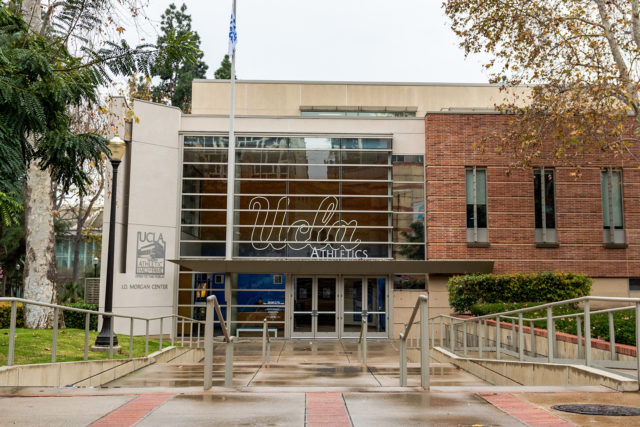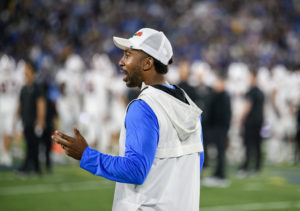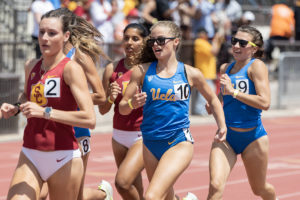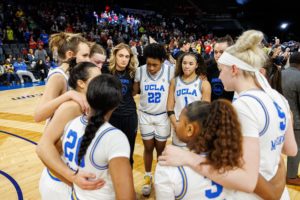This post was updated Dec. 6 at 9:37 p.m.
In the 1950s, the NCAA failed to provide workers’ compensation to the widow of a football player who died following an in-game injury.
Then-NCAA executive director Walter Byers and his legal counsel coined the term “student-athlete” as proof that the family was not entitled to employee benefits or workplace protections.
Since then, the moniker of “student-athlete” has proliferated throughout the NCAA and received an emphatic embrace from individual programs and conferences alike.
UCLA football coach Chip Kelly champions a culture of “books and ball.”
The Pac-12 prioritizes “excellence in academics, athletics, and the well-being of our student-athletes.”
While continued emphasis on the student facet of the NCAA athlete’s experience may appear empowering, a movement to supplant “student-athlete” with “college athlete” has emerged. Proponents argue that “college athlete” more accurately represents the agency of those individuals. They cite athletes’ entitlement to compensation for their labor.
The NCAA now appears to be an ally on that front.
On Tuesday, NCAA President Charlie Baker sent a letter to over 350 Division I programs, proposing a separate competitive tier – akin to the FBS and FCS separation in football – in which schools would compensate at least half of their athletes with a $30,000 yearly payment but still compete with the rest of Division I. The proposal would likely impose new financial challenges, even for highly resourced programs in the Power Five.
Baker’s self-described “forward-looking framework” comes two years after the United States Supreme Court ruled in NCAA v. Alston that the NCAA was violating the Sherman Antitrust Act in restricting compensation for athletes. The NCAA’s subsequent vote to allow college athletes to profit from their name, image and likeness catalyzed a new dawn in college athletics.
According to athlete marketplace and NIL technology company Opendorse, over $1 billion will be spent on NIL in 2023-2024, with over half of the projected total directed toward Power Five football teams.
In an exclusive interview with the Los Angeles Times last week, UCLA athletic director Martin Jarmond appeared to grasp the gravity of this statistic.
“NIL is a major factor in college football today and so we have to put more emphasis and focus in providing NIL opportunities for our student-athletes,” Jarmond told the Times’ Bill Plaschke. “Chip (Kelly) understands that, we know we need to do more in that area.”
As such, UCLA Athletics announced Monday the debut of its partnership with Advance NIL to provide programming for UCLA athletes to learn about financial literacy protections regarding NIL, among other topics.
“Our goal is for student-athletes to develop a foundation for life through their experience with NIL opportunities,” Jarmond said in a statement. “This new initiative will help to ensure that Bruins have access to the best available resources as they navigate this ever-evolving space.”
Advance NIL is intended to supplement existing initiatives within the department-wide NIL program, Westwood Ascent. The recently revamped UCLA Athletics website now features an “NIL” section that directs users to Westwood Ascent’s webpage. The three tenets of Westwood Ascent include “Education, Brand-Building and Monitoring and Disclosure.”
The Wooden Athletic Fund – the long-standing, centralized forum for UCLA Athletics donor activity – website also features its own drop-down section for “NIL Opportunities.” Users can then explore the Westwood Exchange and Men of Westwood tabs.
Men of Westwood is one of “the official collectives for NIL opportunities for the UCLA Bruins” that serves football, men’s basketball and baseball while also promoting its “Champion of Westwood” offshoot to support women’s programs and Olympic sports.
The Westwood Exchange is not a collective but rather a marketplace designed as the middleman between athletes and businesses, donors, alumni or other individuals interested in pursuing an NIL deal. University employees and coaches can’t arrange NIL deal flow, so Westwood Exchange assumes responsibility for that facilitation.
However, Baker proposed an elimination of this restriction, enabling Division I schools to enter into NIL licensing opportunities with their student-athletes – just one of a slew of changes representing how the NCAA has contemporarily changed its tune.
As the post-NCAA v. Alston era continues to unfold, the NCAA’s definition of “student-athlete” is evolving accordingly.





Comments are closed.